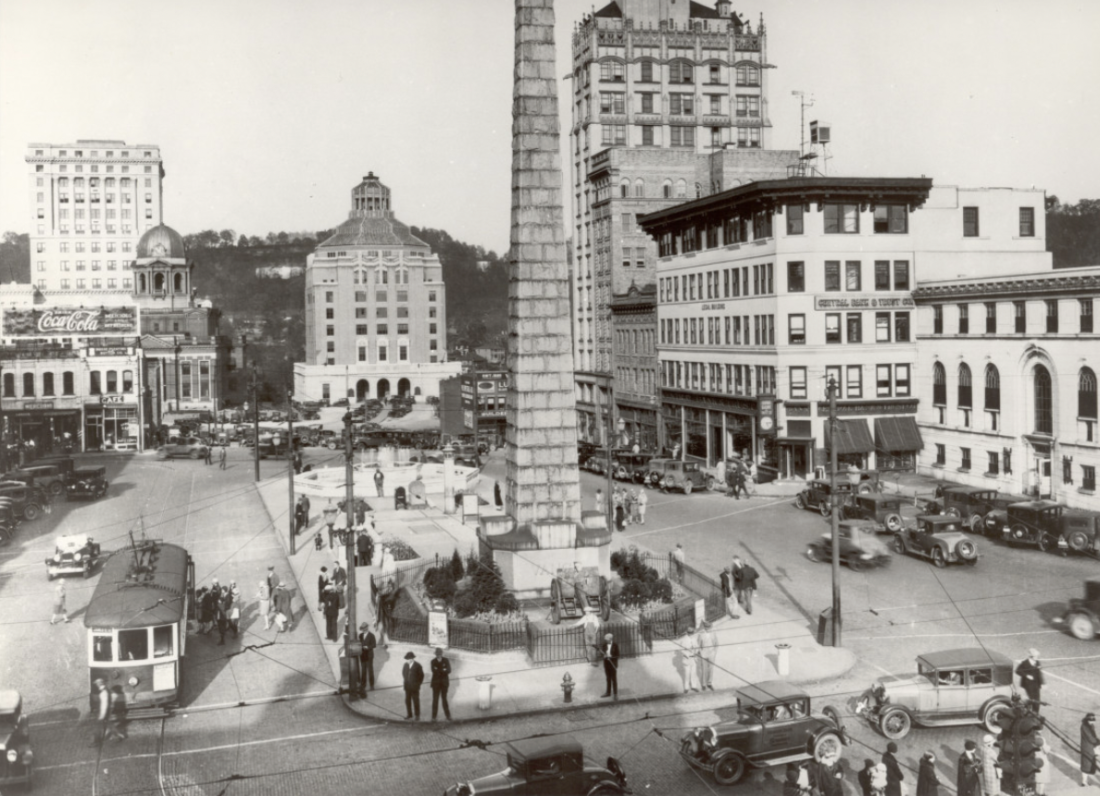The effects of Tropical Storm Helene have dominated Western North Carolina’s news — and our lives — since late September. But Xpress readers voiced plenty of opinions about local issues before the storm as well. A review of letters to the editor, commentaries and online comments published over 2024 yields insights into a variety of concerns that hit close to home.
If you build it

Growth and development were top of mind for many readers. In the most widely read commentary of the year, author and former Asheville resident Nan K. Chase took the long view in a February piece, describing how Asheville of 100 years ago hosted “one of the biggest construction blowouts in American history.”
“During the 1920s the city borrowed and built until a bank crash in 1930, coming on the heels of the 1929 stock market collapse, exposed the rotting foundations: criminally negligent administrators whose malevolence stripped virtually all public deposits from the city, county, school district and other administrative (and debt-issuing) governmental units,” wrote Chase. “During the Depression, Asheville’s street maintenance crews were let go. Schools closed, and the Fire Department lost a quarter of its strength. And it was the collapse of those municipal services a century ago from which Asheville now suffers.”
The combination of development and tourism growth fueled by the Buncombe County Tourism Development Authority prompted one of the most commented-on letters of the year. “Tourism Development Authority President and Explore Asheville CEO Vic Isley has a lot of gall reducing the criticisms toward the TDA to just emotional reactions,” wrote Alexander reader Troy Amastar in April.
Continued Amastar: “I watched this little city that I loved transform by the spending of millions on tourism and catering to all things tourist-oriented. So many hotels. Expensive food and boutiques (since rent is astronomical). Back in the day, we had Stone Soup. And funky little shops. It was still affordable.”

Retired professor John Diamond-Nigh suggested in May that Asheville’s development boom had downgraded its architectural offerings.
“Asheville is a living museum of great past architecture, a sort of declaration of our independence from standard idioms of design, a declaration of our civic guts,” offered Diamond-Nigh. “Yet what of that distinguished legacy is reflected in our current and utterly unremarkable boom?”
Development concerns also sparked satire from commentary writer Robert McGee, who in a July essay imagined a city where density is king: “Neighborhoods including but not limited to Lake View Park, Grove Park and Reynolds Mountain, where multitudes of retirees are rumored to pad about in echoey mansions searching for misplaced pickleballs, would be replaced with nifty fourplex People Pods near bike lanes and public transport corridors.”
Meanwhile, in an August commentary, local writer Bill Branyon examined the Interstate 26 Connector , the massive road-widening project whose effects were already starting to be felt.
“According to the NCDOT’s final environmental impact statement, the connector will plow through 114 houses and force 35 businesses and two nonprofits to move,” wrote Branyon. “For these affected entities, the I-26 Connector may turn out to be a massive disconnector.”
To rezone or not to rezone
At a micro level, no project sparked more letters to the editor and comments in 2024 than the Meadows at Haw Creek, whose developers sought conditional rezoning to build a higher-density residential development on 27 acres of farmland and forest in East Asheville.
“Like much of the nation, Asheville faces a housing affordability crisis. The solution to that crisis for Asheville is to build a lot more housing throughout the entire city, including in my neighborhood,” wrote Asheville reader Joel Shuman in a February letter that generated robust online comments.
Countered online commenter John Appleby: “Joel — you’ve been bamboozled. These houses will not be affordable. There’ll just be a lot of them on a small parcel of land. It would be much better for the developer to show some humility and put forth a project more in keeping with the land and surrounding areas.”
In the end, following negotiations that involved developer Kevin Jackson, the Haw Creek Community Association and Mayor Esther Manheimer, Asheville City Council voted 5-1 in late July to approve an 84-home version of the original project.
Cracks in the ivory tower

The uncertain fate of programs at UNC Asheville likewise prompted community concern. An April proposal to dismantle the UNC system’s diversity, equity and inclusion policy met pushback from Diamond Forde, an assistant professor of English at UNCA.
Wrote Forde: “Let’s pass the mic and be transparent about who is being targeted here: … The UNCA Office of Multicultural Affairs, which fosters campus community, offers trainings, workshops and graduation celebrations, and manages affinity groups; which facilitates the hard work of collecting and verifying bias reports; and which the students have said have ‘positively impacted’ their college experience and helped them feel like they ‘belonged to the campus community.’”
Yet in late May, the UNC System Board of Governors voted to repeal and replace its DEI policy, affecting all 17 schools in the system.
Then in June, UNCA Chancellor Kimberly van Noort announced that, due to a $6 million budget deficit, the university planned to eliminate four academic programs — ancient Mediterranean studies, drama, philosophy and religious studies — and curtail the Languages and Literatures program.
The move, which was approved by UNC Board of Governors in July, prompted a cluster of letters and comments.
“Van Noort suggests that these changes will not affect the liberal arts identity at UNCA,” wrote Alex Sosler, a Montreat College professor who lives in Asheville. “But the liberal arts aren’t cultivated by osmosis. It requires departments, people, positions and intention to teach them well. The virtues of liberal arts can’t be assumed in an otherwise pragmatic curriculum oriented toward making money.”
‘A Jew in Asheville’

In June, veteran Xpress columnist Jerry Sternberg concluded his long-running series, “A Jew in Asheville,” examining the history of Jews in this community.
One colorful anecdote involved the Ku Klux Klan applying for permits to march and hold rallies in the streets of both Asheville and Hendersonville when Asheville native Ken Michalove (the city’s first Jewish person elected mayor) was Asheville’s mayor and his cousin Don Michalove was mayor of Hendersonville.
“Imagine their mortification when, in each case, they had to obtain their permit from a ‘Jew mayor,’” Sternberg wrote. “One of the Klan leaders supposedly remarked that ‘All mayors in Western North Carolina are named Michalove, and they’re all Jews — and they’re not coming back.’ History, however, has proved him wrong: In the last 35 years, Asheville has had six mayors, and three of them have been Jewish, including our present one.”
HCA and more
HCA, owner of Mission Hospital, continued to be the subject of news as well as opinion over the past year. In April, Asheville reader Dr. Bruce Kelly offered: “The recent N.C. Department of Health and Human Services’ findings of nine immediate jeopardy findings, including several deaths, highlight the seriousness of issues around patient safety and quality of care, these in the emergency department. It’s imperative that we as a community remain informed.”
Post-Helene, however, Mission employee William Boeheim offered praise for how the hospital and its owner responded to the disaster: “HCA in our time of desperation here in Western North Carolina came through here with all its power, connections, supplies and strength like no other company could have. We were fortunate to have them when our worst natural catastrophe struck our region.”
Meanwhile, a long-running controversy over the Vance Monument came to an end in 2024 with the dismissal of a lawsuit over its demolition. Xpress readers marked the event with a handful of letters, including one published in April from Asheville reader Fisher Caudle, who suggested that the next order of business should be to change the city’s name.
“Like many who’ve been waiting on the result of this ruling, we now should all agree to change the name of the city of Asheville to a newer, more modern, meaningful name that does not honor a slave owner,” offered Caudle.
After the storm
Of course, late September brought Tropical Storm Helene, just barely in our rearview mirror.
One of the first letters we published about the storm struck a hopeful note — one that may be important to take into the new year.
“The needs remain massive, but by the grace of God, the response has been immense as well,” wrote Rob and Katie Allyn of Candler. “So grateful for all the first responders and volunteers who inspire and encourage us every day. Together, we shall overcome! #AVLSTRONG”




Before you comment
The comments section is here to provide a platform for civil dialogue on the issues we face together as a local community. Xpress is committed to offering this platform for all voices, but when the tone of the discussion gets nasty or strays off topic, we believe many people choose not to participate. Xpress editors are determined to moderate comments to ensure a constructive interchange is maintained. All comments judged not to be in keeping with the spirit of civil discourse will be removed and repeat violators will be banned. See here for our terms of service. Thank you for being part of this effort to promote respectful discussion.